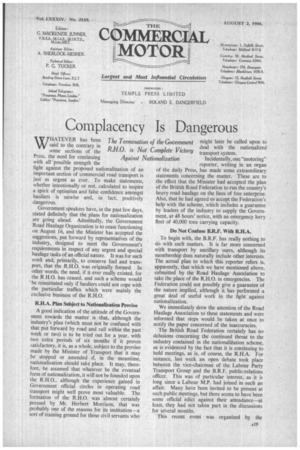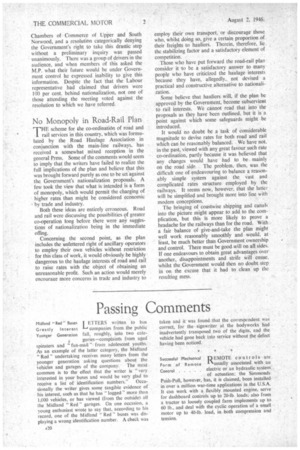Complacency Is Dangerous
Page 21

Page 22

If you've noticed an error in this article please click here to report it so we can fix it.
WHATEVER has been said to the contrary in some sections of the Press, the need for continuing with all -possible strength the fight against the proposed nationalization of an important section of commercial road transport is just as urgent as ever. To make statements, whether intentionally or not, calculated to inspire a Spirit of optimism and false confidence amongst hauliers is unwise and, in fact, positively dangerous.
Government speakers have, in the past few days, stated definitely that the plans for nationalization are going ahead. Admittedly, the Government Road Haulage Organization is to cease functioning on August 16, and the Minister has accepted the suggestions, put forward by representatives of the industry, designed to meet the Government's requirements in respect of any urgent and special haulage tasks of an official nature. It was for such work and, primarily, to conserve fuel and transport, that the R.H.O. was originally formed. In other words, the need, if it ever really existed, for the R.H.O. has ceased, and such a scheme would ' be reinstituted only if hauliers could not cope with the particular traffics which were mainly the exclusive business of the R.H.O.
R.H.A. Plan Subject to Nationalization Proviso A good indication of the attitude of the Government towards the matter is that, although the industry's plan (which must not be confused with that put forward by road and rail within the past week or two) is to be tried out for a year, with two extra periods of six months if it proves satisfactory, it is, as a whole, subject to the proviso made by the Minister of Transport that it may be stopped or amended if, in the meantime, nationalization should take place. It may, therefore, be assumed that whatever be the eventual form of nationalization, it will not be founded upon the R.H.O., although the experience gained in Government official circles in operating road transport might well prove most valuable. The formation of the R.H.O. was almost certainly pressed by Mr. Herbert Morrison, that was probably one of the reasons for its institution—a sort of training ground for those civil servants who might later be called upon to deal with the nationalized transport system.
Incidentally, one "motoring" reporter, writing in an organ of the daily Press, has made some extraordinary statements concerning the matter. These are to the effect that the Minister had accepted the plan of the British Road Federation to run the country's heavy road haulage on the lines of free enterprise. Also, that he had agreed to accept the Federation's help with the scheme, which includes a guarantee by leaders of the industry to supply the Government, at 48 hours' notice, with an emergency lorry fleet of 40,000 tons carrying capacity.
Do Not Confuse B.R.F. With R.H.A.
To begin with, the B.R.F. has really nothing to do with such matters. It is far more concerned with transport by ancillary users, although its membership does naturally include other interests. The actual plan to which this reporter refers is, apparently, that which we have mentioned above, submitted by the Road Haulage Association to take the place of the R.H.O. in emergencies. The Federation could not possibly give a guarantee of the nature implied, although it has performed a great deal of useful work in the fight against nationalization.
We immediately drew the attention of the Road Haulage Association to these statements and were informed that steps would be taken at once to notify the paper concerned of the inaccuracies.
The British Road Federation certainly has no delusions concerning the continued threat to the industry contained in the nationalization scheme, as is evidenced by the fact that it is continuing to hold meetings, as is, of course, the R.H.A. For instance, last week an open debate took place between the vice-chairman of the Labour Party Transport Group and the B.R.F. public-relations officer. This was of particular interest, as it is long since a Labour M.P. had joined in such an affair. Many have been invited to be present at such public meetings, but there seems to have been some official edict against their attendance—at least, they had not taken part in the discussions for several months.
This recent event was organized by the Chambers of Commerce of Lipper and South Norwood, and a resolution categorically denying the Government's right to take this drastic step without a preliminary inquiry was passed unanimously. There was a group of drivers in the audience, and when members of this asked the M.P. what their future would be under Government control he expressed inability to give this information. Despite the fact that the Labour representative had claimed that drivers were 100 per cent. behind nationalization, not one of those attending the meeting voted against the resolution to Which we have referred.
No Monopoly in Road-Rail Plan
'THE scheme for the co-ordinatiOn of road and I rail services in this country, which was formulated by the Road Haulage Association in conjunction with the main-line railways, has received a somewhat mixed reception in the general Press. Some of the comments would seem to imply that the writers have failed to realize the full implications of the plan and believe that this was brought forward purely as one to be set against the Government's nationalization proposals. A few took the view that what is intended is a form of monopoly, which would permit the charging of higher rates than might be considered economic by trade and industry.
Both these ideas are entirely erroneous. Road and rail were discussing the possibilities of greater co-operation tong before there were any suggestions of nationalization being in the immediate offing.
Concerning the second point, as the plan includes the unfettered right of ancillary operators to employ their own vehicles without restriction for this class of work, it would obviously be highly dangerous to the haulage interests of road and rail to raise rates with the object of obtaining an unreasonable profit. Such an action would merely encourage more concerns in trade and industry to employ their own transport, or discourage those who, whilst doing so, give a certain proportion of their freights to hauliers. Therein, therefore, lie the stabilizing factor and a satisfactory element of competition.
Those who have put forward the road-rail plan consider it to be a satisfactory answer to many people who have criticized the haulage interests because they have, allegedly. not devised a practical and constructive alternative to nationalization.
Some believe that hauliers will, if the plan be approved by the Government, become subservient to rail interests. We cannot read that into the proposals as they have been outlined, but it is a point against which some safeguards might be introduced.
It would no doubt be a task of considerable magnitude to devise rates for both road and rail which can be reasonably balanced. We have not. in the past, viewed with any great favour such rate co-ordination, partly because it was believed that any changes would have had to be mainly on the road side. The problem, then, was the difficult one of endeavouring to balance a reasonably simple system against the vast and complicated rates structure employed by the railways. It seems now, however, that the latter will be simplified and brought more into line with modern conceptions.
The bringing of coastwise shipping and canals into the picture might appear to add to the complication, but this is more likely to prove a headache for the railways than for the road. With a fair balance of give-and-take the plan might well work reasonably smoothly and would, at least, be much better than Government ownership and control. There must be good will on all sides. If one endeavours to obtain great advantages over another, disappointments and strife will ensue, whilst the Government would then no doubt step in on the excuse that it had to clean up the resulting mess.




































































